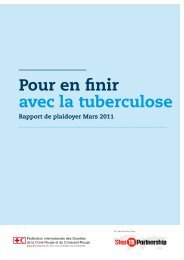Thailand - Stop TB Partnership
Thailand - Stop TB Partnership
Thailand - Stop TB Partnership
You also want an ePaper? Increase the reach of your titles
YUMPU automatically turns print PDFs into web optimized ePapers that Google loves.
Community-based DOTS<br />
<strong>TB</strong> should not be seen as an ‘experts-only’ disease; it affects everyone and<br />
everyone has a role to play.<br />
—Jamillah Mwanjisi, Public Health Watch researcher and director of<br />
Media Bank, Tanzania 54<br />
National <strong>TB</strong> programs in Bangladesh, Tanzania, and <strong>Thailand</strong> have sought to make <strong>TB</strong> treatment<br />
more accessible and affordable by initiating community-based <strong>TB</strong> programs, often in<br />
collaboration with NGOs. Though many of these programs have shown impressive results at<br />
relatively low cost, few have attracted sufficient investment and support for scale-up, either<br />
from domestic sources or international donors.<br />
In response to lack of government capacity to administer DOT through health care<br />
workers in every community, BRAC and other NGOs provide community-based <strong>TB</strong> services<br />
in over two-thirds of Bangladesh. The BRAC approach—the most widely used model of<br />
its kind in the country—revolves around the shastho shebika, or female community health<br />
worker. Shastho shebikas are trained to identify <strong>TB</strong> symptoms and refer patients to <strong>TB</strong> diagnostic<br />
centers in the communities in which they live. Once a community member is diagnosed<br />
with <strong>TB</strong>, shastho shebikas obtain free <strong>TB</strong> drugs, administer DOT at the household<br />
level, and record and report relevant data to BRAC and to the NTP. Shastho shebikas receive<br />
significant support from BRAC in the form of regular training and refresher courses as<br />
well as the opportunity to earn income: they are permitted to sell pharmaceutical supplies<br />
in their communities, and for each <strong>TB</strong> patient cured, they receive a small fee of Tk 125<br />
(approximately $1.90). Many reportedly gain personal satisfaction and prestige from their<br />
jobs as well. As one shastho shebika noted in a recent interview, “I enjoy my work because it<br />
has gained me respect in my community.” 55<br />
The BRAC model of community-based care has achieved impressive results: treatment<br />
success rates at or above the global target of 85 percent, 56 at a cost of 50 percent less<br />
than the equivalent services in areas covered by the NTP. 57 BRAC’s community-based DOTS<br />
program has also reaped impressive social dividends. Shastho shebikas distribute information<br />
and raise awareness not only about <strong>TB</strong>, but about a range of health issues, and not just<br />
to people with <strong>TB</strong> symptoms, but to the entire community, thus defusing stigma. Shastho<br />
shebikas report that people who have recovered from <strong>TB</strong> are often their greatest allies in<br />
encouraging others to report symptoms and seek treatment. And the fact that BRAC’s <strong>TB</strong><br />
services are implemented in collaboration with the Bangladeshi government, which provides<br />
free drugs, monitoring, and supervision, reinforces governmental capacity and leadership<br />
on <strong>TB</strong> control.<br />
Pilot community-based DOTS programs have also demonstrated positive treatment<br />
outcomes at relatively low cost in the Kilombero and Temeke districts of Tanzania.<br />
PUBLIC HEALTH WATCH MONITORING REPORTS 25



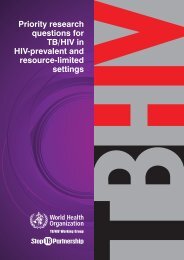
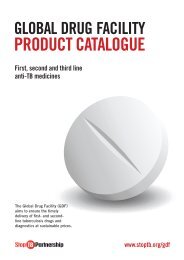
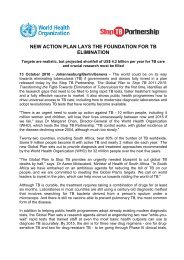
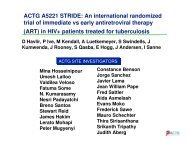
![Global Drug Facility Annual Report 2011 [.pdf] - Stop TB Partnership](https://img.yumpu.com/26788745/1/184x260/global-drug-facility-annual-report-2011-pdf-stop-tb-partnership.jpg?quality=85)

![Concept note on national stop TB partnership [.pdf]](https://img.yumpu.com/26788741/1/184x260/concept-note-on-national-stop-tb-partnership-pdf.jpg?quality=85)
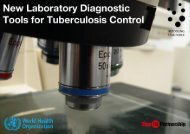
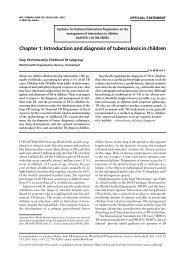
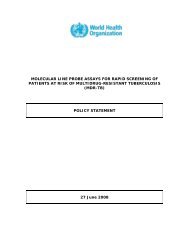
![2005 and Challenges for 2006 - 2015 [.pdf] - Stop TB Partnership](https://img.yumpu.com/26788674/1/190x245/2005-and-challenges-for-2006-2015-pdf-stop-tb-partnership.jpg?quality=85)
![Brochure (French) [.pdf] - Stop TB Partnership](https://img.yumpu.com/17234792/1/190x91/brochure-french-pdf-stop-tb-partnership.jpg?quality=85)

